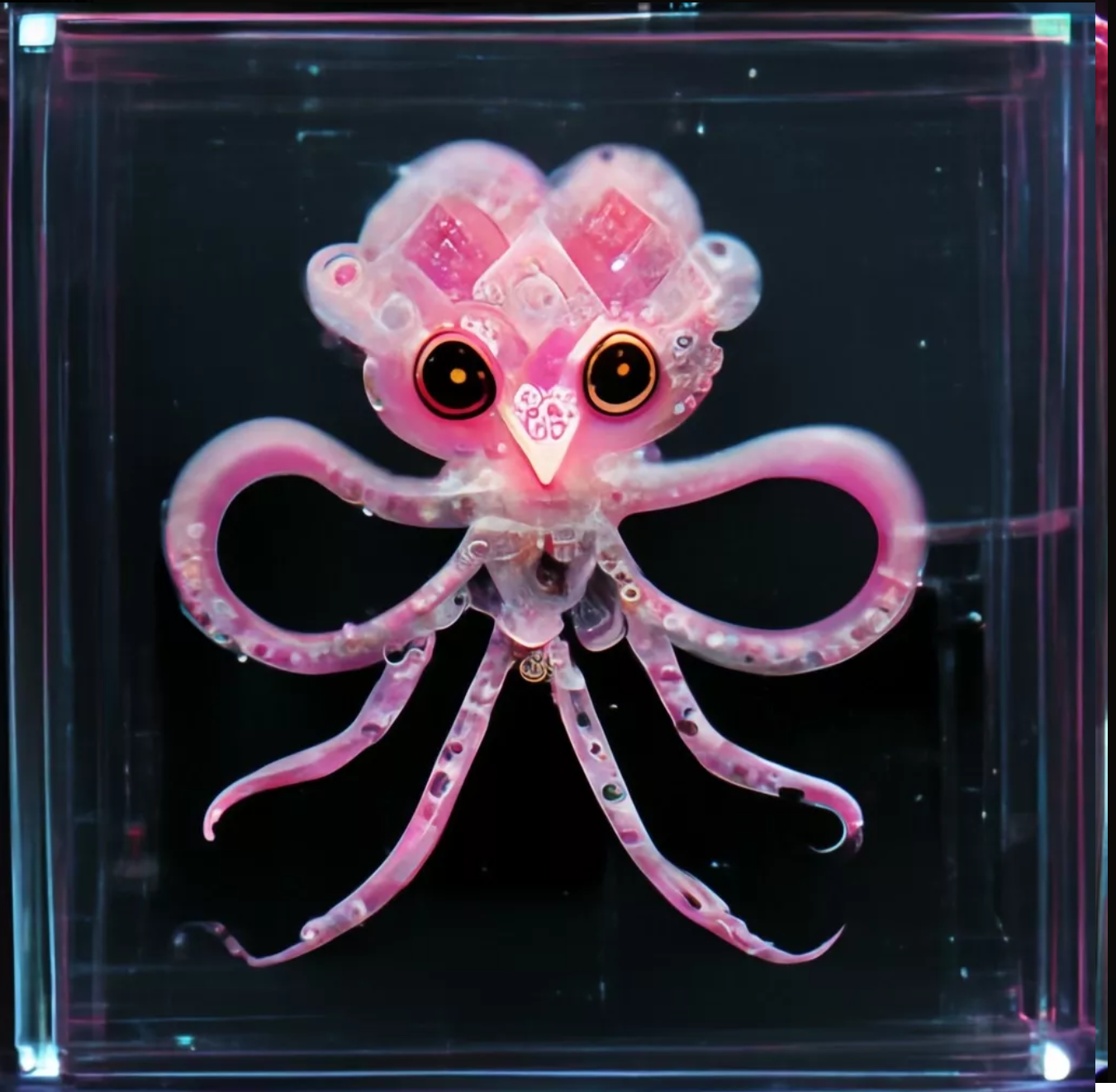The Cottagecore Coder
Coding for Life: on learning to garden and program at the same time.
Last year I began learning to code beyond basic html and the two classes that were available at my high school. As I continue learning code, I'm also planting my first garden. This post is about the benefits of gardening and programming as companion skillsets.
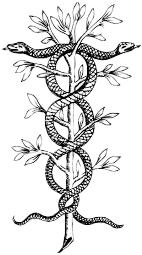
I often think of life as code, the DNA of wondrous creatures expressing their combinations of ACGT. I also think code needs to be more in service of life. Code that runs our digital engagement with each other across the planet, code that runs our legal and economic systems. It all needs to be re-routed in service of life. And more of us need to step up and participate in that.
Gardening is a gateway to orienting to Earth and caring for her. It also enriches the patterns and complexity with which I am able to see structures and build architectures. The two together is a magical experience of creation. 10/10 would recommend.
I'd also encourage more plant people to try out programming, because the world also needs more people with coding skills who have deep context for and exposure to systems of life. If you're at all mathematically inclined, or have experience as a musician, it's not really that hard. I found frontend styling an easy entry point since it felt less abstract, and I'm progressively going deeper into the backend and infrastructure layers of coding.
Read on for more encouragement, whichever direction you're coming from.
How gardening nurtures my spirit
Gardening is the best thing ever. It attunes you to small observations of life around you. Putting your hands in the dirt to get food is primal and orients your body to be in relationship with earth. It can be free if you get seeds from a friend or regional seed keepers. It also puts you in primal relationship with water. My experience of rain is different after becoming a gardener. I am in relation with plants, so I feel their joy and understand the meaning of water more deeply. Magical, nurturing life force that rains from the sky, that's amazing.
It's pure wonder to see the different sizes of seeds. Something about knowing what the seed of a plant I like to eat looks like helps me feel more connected to it and empowered to make it, to know I can feed myself great things. Similarly, learning to code has me feeling empowered to make the internet how I want it to be, to build and grow codebases that help people connect with each other in healthy, more autonomous ways.
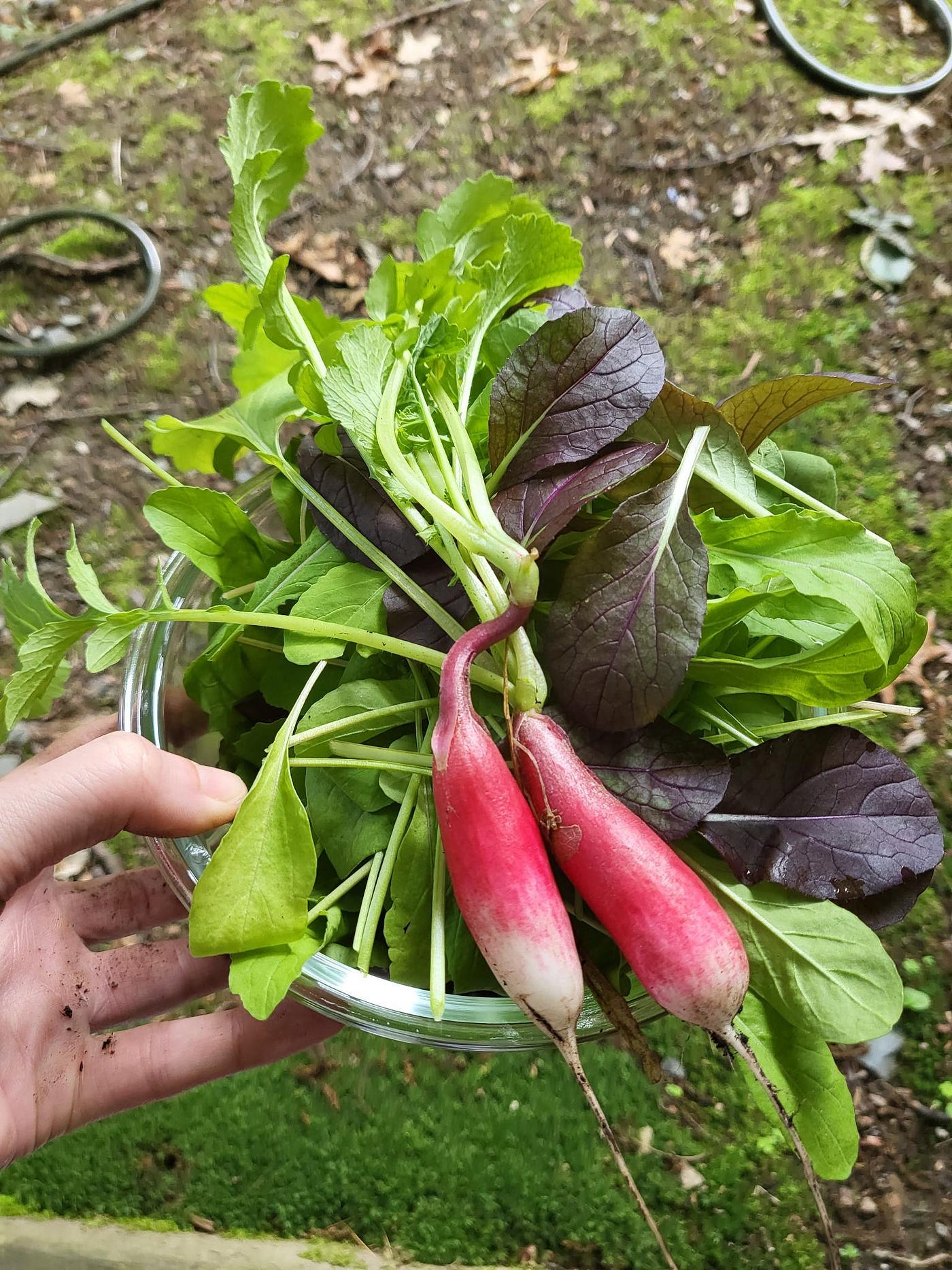
"I have the sprouts! They did the thing!!!" Is a lot different feeling than the joy of your code working. It is, really, alive. And as much as I am an atheist animist (someday I'll write a blog post about that), life has spirit and you can feel it. It is your sister or brother.
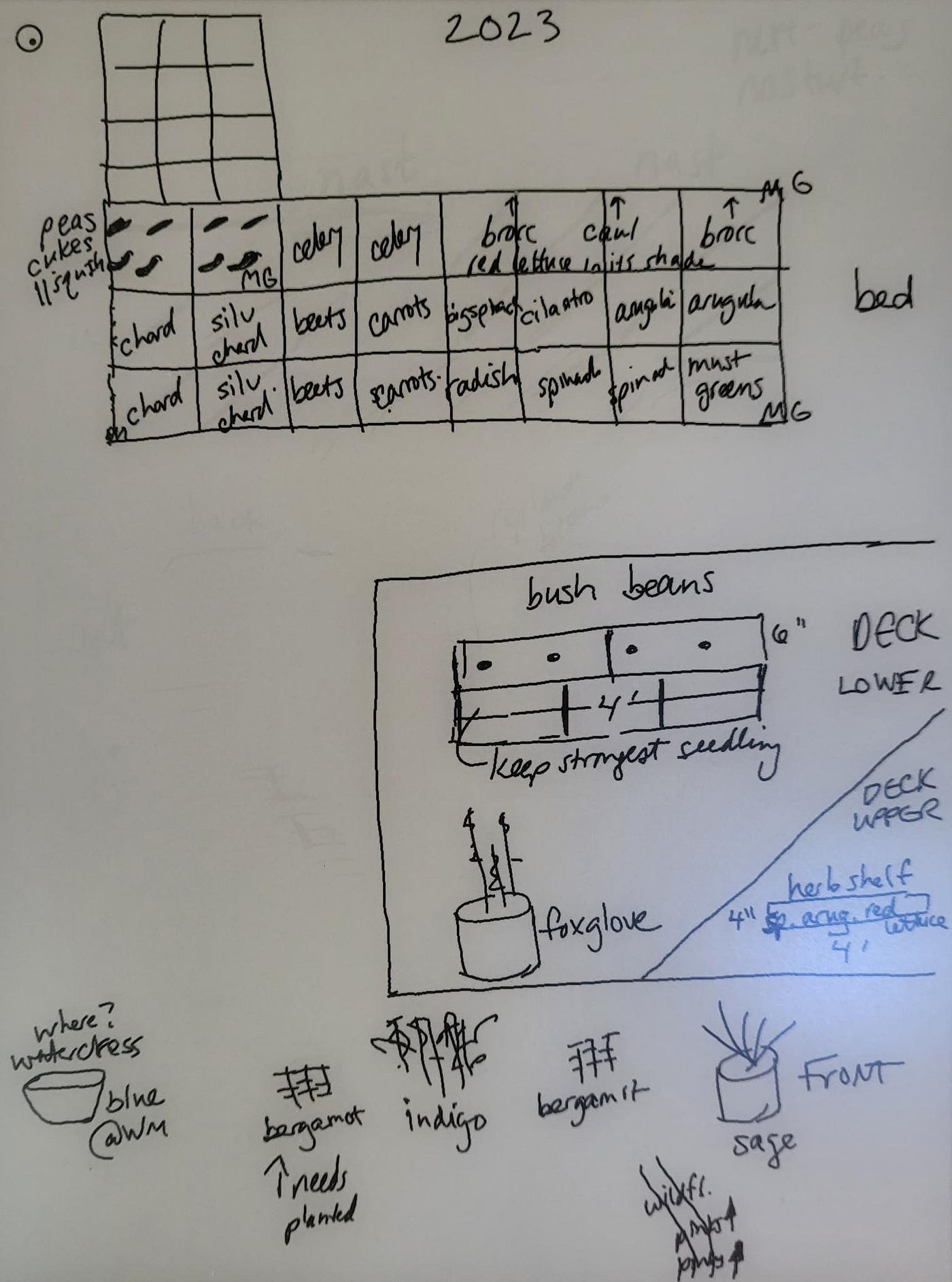
Planting this drawing was such a cool feeling. I also do graphic design, UI/UX on Bloom, so making a design come to life in code is super fun. But seeing a drawing literally come to life…. extradimensional design!
If you do permaculture, agroforestry, or square food method of container gardening, you don't have to spend much time weeding. Actually, living in the Northeast US my only disappointment about gardening is how little maintenance time it needs, because it rains often here. Time for a larger garden!
Gardening is also a nice form of meditation. I care for my plants and enjoy the sun on my face and touch soil to connect to what is important and orient myself for the day. Around life. It's also helped address my repetitive stress injuries from overworking at a computer. I break up my day more often to go outside and be with my plants and the plants in the neighborhood and breathe and calm down. If you've ever looked at a tree and thought "whoa that is high resolution", gardening is for you.
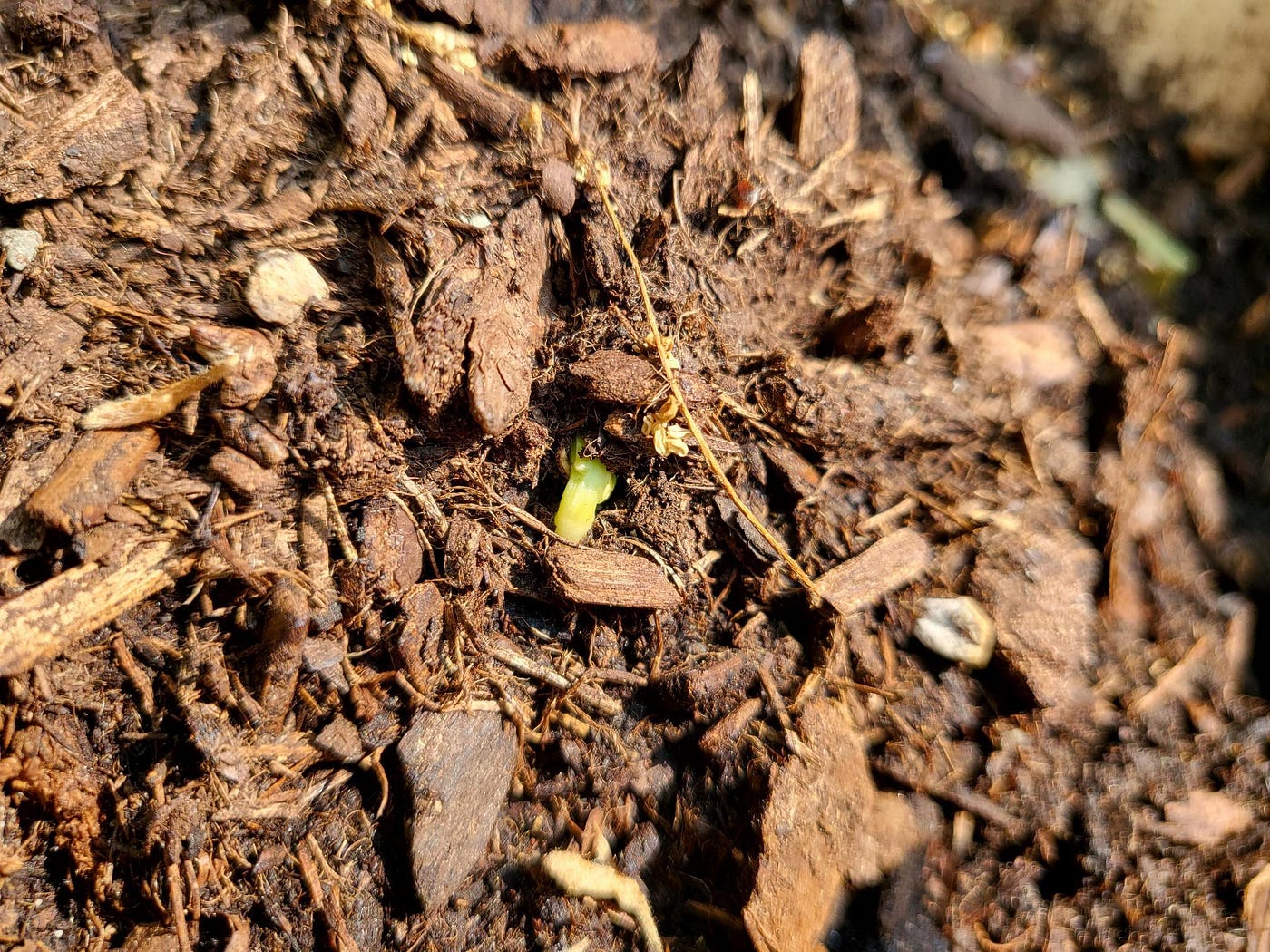
My first garden sprout!
Thinking about soil is the most surprising thing to me about gardening. I used a container bed and pots because I'm not sure what chemicals the landscapers at this rental complex put on the grass. I planted some plants in the ground, some of which was like clay, or rocky, and I instantly thought about soil quality everywhere. It's something I hear a lot about in the context is carbon drawdown and climate disaster mitigation, and in reading about good conditions for plants (some like it more or less acidic for example). Despite growing up on a farm (small-scale industrial), I'd literally never thought about soil. It's one of the biggest factors in climate change, in its ability to absorb carbon through fungi on plant roots, resuscitate healthy water levels, reduce risks of flooding and erosion, and many other things. But that all suddenly got more real for me.
I design platforms that are for helping people address those things, so it's helpful for it not to be an abstract concept that I hear words about but don't encounter directly.
How coding trains my mind
My mind inherently thinks in terms of nature patterns. I grew up on a farm wandering around the hills of native prairie. I also happen to be synesthetic — that means my senses are sort of cross-wired. When I see something I feel as though I'm experiencing my body moving as that thing. Same when I hear sounds. I also "see" sounds. I will write a separate blog post on this.
My mind moves more along the lines of fungi, networked thinking, relational thinking. Logic is not something I was ever trained in in any way at all, having never finished college and growing up in a rural area with rudimentary schooling.
Learning to code is helping me think linearly and order my thoughts. The practice of needing to write logical statements to make data move between components, set permissions of what type of person using the interface has access to what sets of information, and how it is displayed — all of that helps me think logically on how to get from an overall gestalt of understanding what needs to happen, and put in place the wiring to get there.
There's a reason coding is called software architecture. It's not just logic, it's also a lot of spatial reasoning and planning — skills that gardeners and farmers use as well.
Coding has given me a tremendous sense of empowerment with technology. Instead of being frustrated at how much the internet, marketing algorithms, and geopolitical manipulation of information sucks people away from real relationships with each other and the world around them, I can do something about it, right now, with rad people.
If you are a plant person, gardener, farmer or nature freak, I encourage you to follow your curiosity if you've ever seen something that you would like to be different about the digital world, or a type of thing you'd like to create but seems intimidating to start.
Computer science needs more plant-minded folk.
The internet!!
I thought learning to garden would be a) hard and b) something I have little patience to learn and would slowly learn how over time with many mistakes. Similarly, I've, well, I didn't think programming would be hard I just ran into a lot barriers. We had two classes on it in my high school (pre-YouTube or Google), when I went to college I encountered sexual abuse from classmates and faculty, and got lost for a long time in a maze of trauma.
Both gardening and learning to code have been "best of the internet" experiences for me, with so many how-to's and people helping each other online. This gives me hope for global collaboration on large-scale problems.
We just need to get the internet out of corporate silos and into community and person orientation. Bloom Network is a small step toward that. We are a local-first, cooperative social media network that helps more people find and participate in climate and social repair. That's what I code on.
If I could cross-wire two search areas using ML, I would cross-wire ecology and technology. (Oh yes dear reader, I will do this, and I will make it sexy.) Not like, global North ecology and carbon credits and farm tech, but rootsy ecology, get out there and plant shit and form regional cooperative farmland trusts and stop murdering Indigenous people and displacing them to drill oil. Want to stop carbon emissions from cars? Build regional economic networks and stop commuting to jobs that make us sad. Not to shame people, just, we can totally build tech differently. We just all need to make the time to do it, and do anything we can to remind ourselves how what we program is connected to life whether we have that front of mind or not. Blockchain tech is right there to program economic networks that make this completely viable. (I wrote a whitepaper about that.) I'm getting closer to writing a properly excoriating piece on the fact that everything that needs funding and is incredibly, comparatively, cheap to implement compared to most things that government and tech are funding, gets no funding because it doesn't make outside parties more money or prestige.
Gardening is a gateway to seeing how to build tech differently, and reconnecting your body to the cycles of abundance that are available to us all if we unplug from the — very specific kind of — machine. That machine runs on economic scarcity code and more of us need to stop playing that game and look — down.
Coding for life
Nature is magic. Nurture her.
Seeds are sustenance.
Seeds are culture.
Seeds are true wealth.
Seeds are shade.
Seeds are magic.
Seeds are the future.
Bloom
Gardening makes me think about abundance cycles and tech built on that principle, not scarcity.
There's an apple tree in our yard, in a suburban area. Immediately upon noticing it, I realized I'd only seen or heard two bees lately. I wondered, "Are there enough to pollinate it or if should I hand pollinate it? That's a lot of work." It's easy to see how it's logical to plant pollinator plants and even have bee hives to attract bees, so you have apples, and so on. Starting to garden helps you connect with the cycles of life and symbiosis of different plants, animals, and insects. And it's an instant, direct, felt effect.
Yes nature can destroy you, but she generates enormous abundance if you care for her and respect her. We need to reconnect our technology infrastructure to life's organic living cycles, now.
I saw a psychic a while back for the first time. It's so not a thing I would do, but she came ravingly highly recommended by people I love and I was at a big transition moment. Anyway, she said part of my leadership in technology is around building technological economic systems that are based in the principle of abundance in nature, not artificial scarcity. This post is my first writing at sharing with you the physical experience of that.
About the author:
Magenta does coding, UI/UX, and systems architecture at Bloom Network, and works as a project manager with dOrg.tech, a developer collective that builds tooling for decentralized organizations and finance. You can find her writing at magewrites.com and on bloomnetwork.earth
If this post inspired you, let me know on LinkedIn!

